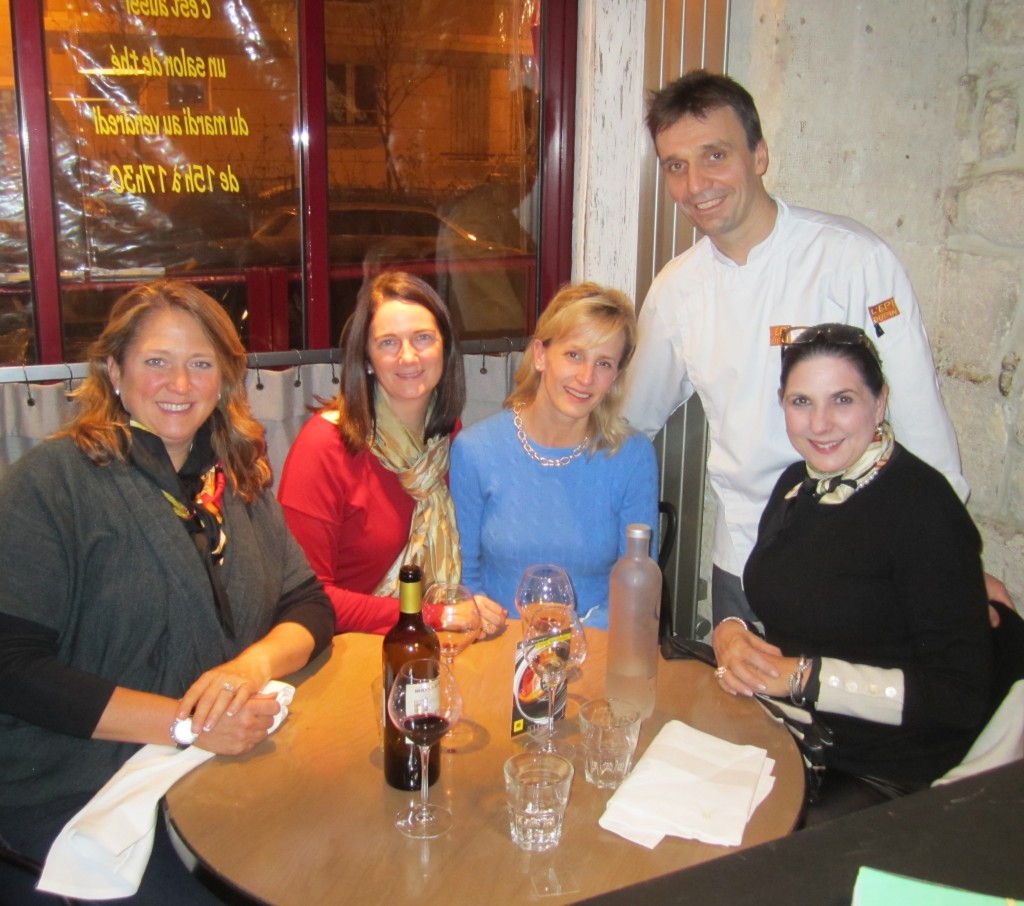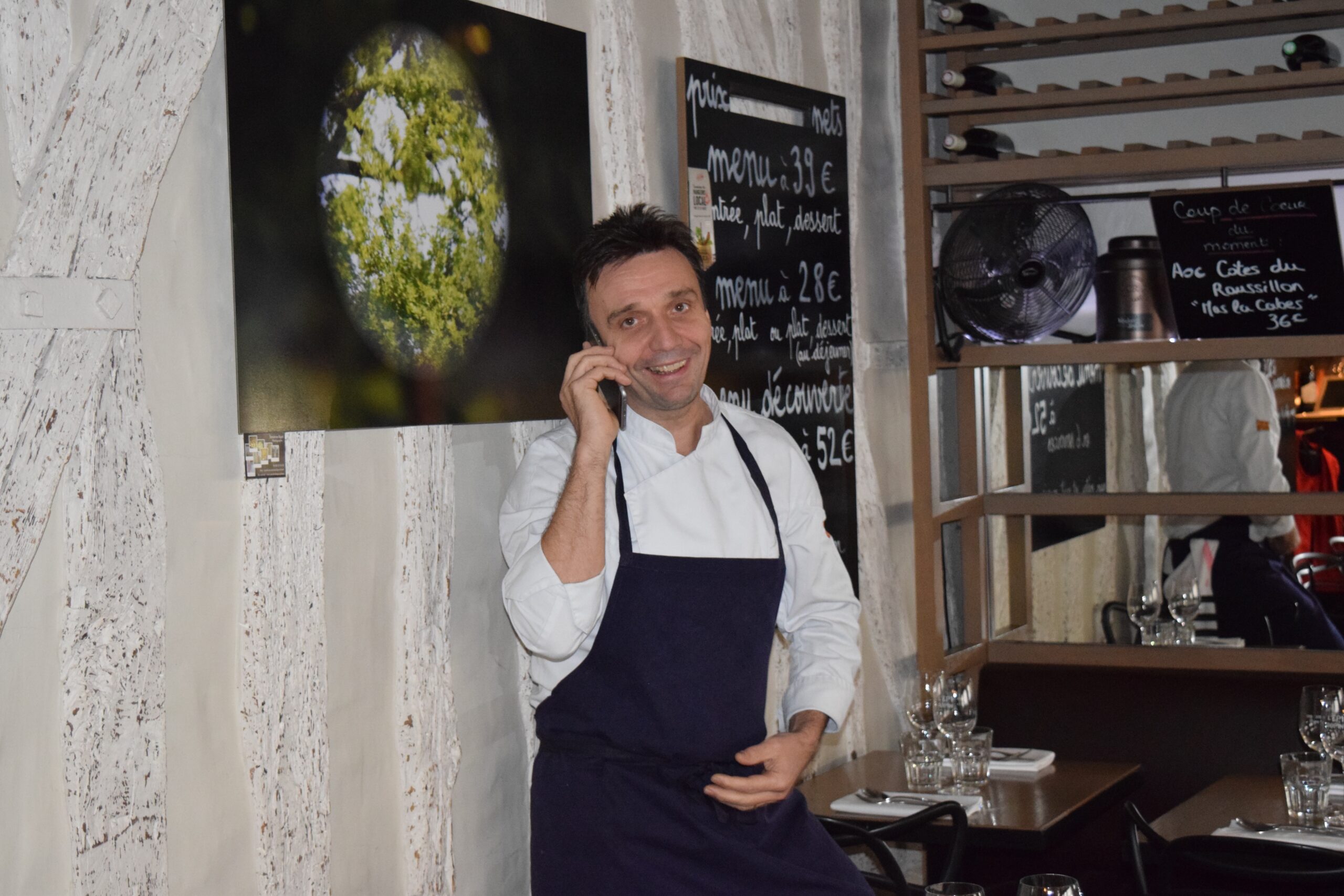
Jan 2013 Gal Pals with Chef Pasteau of l’Epi Dupin
*My favorite French chef may not have a Michelin star but he has one of the brightest culinary minds in Paris. François Pasteau, former owner and executive chef of L’Epi Dupin in Paris is committed to helping change the way we think about food, one plate at a time.
I caught up with Pasteau and sat down with him for an insightful interview revealing his passion for feeding the globe responsibly.
Priscilla Pilon: You are known for cooking sustainable fish. Please share your philosophy around this.
François Pasteau: When I buy, I buy from an area where there is enough fish. I will not serve fish that is not found in great numbers. My customers don’t always know the sustainable fish so my goal is to show the customers which ones are plentiful and delicious so they have the idea to buy the same when shopping for their own homes. The chef has the responsibility to let the customer know that they can do something for the climate and their health easily just in taking the time to think about what they buy.
We are close to seven billion people on the planet and in 2050 it is estimated to be nine billion and I think that if we want to feed all those people we have to think differently how we eat now. Eat less, less meat and fish and more vegetables because to grow one kilo of beef we need 14,000 liters of water and a lot of soil so it’s bad for the climate.
We don’t need so many proteins but good quality at a good price to pay the farmers so they can carry on with their jobs in a good way. When you buy high quality products you live healthier and everyone is happy.
I hear you teach your students at Ferrandi: The French School of Culinary Arts about the perils of wasting natural resources. Why is this so important?
At Ferrandi it is important to teach future chefs how to respect every product in their hands. They have the power to change the future with where they source food and how they serve food. It’s important to give the students direction so they start their careers off respecting the food cycle. I am proud to say the students catch on easily and they take it into their professions. I am positive for the future.
How come more chefs do not use local produce in Paris?
On Mondays I go to see the farmers as close to the city as I can to buy as many vegetables as I can; usually 90 percent is coming from around Paris, including milk, butter, and cheese. The main problem is the logistical one. The farmers don’t want to deliver it into the busy city. Now I try to put together a group of chefs to have it delivered at the same time to make it easier for the farmer to say yes to sell it to us.
How often do you shop for the restaurant?
Right now I go shopping three times per week so I can understand what is available. Winter is the time for cabbage, carrots, turnips, squash, and pumpkin. What is great is we have seasonal vegetables and fruit. It can be difficult when you make a great recipe and now the product is finished for the season, but it’s good to be frustrated because when the products come back in season you appreciate them even more.
How do foodies and families fit into the equation of feeding the planet responsibly?
The consumers can do a lot of positive things for the earth. I like to say that we are all voting to help the planet or not three times per day (breakfast, lunch and dinner) with our meal choices. You vote with what is on your plate, how much is on your plate, and how it got there.
The parents in the house have to teach the kids at home how to eat responsibly. School is not the place to learn it. I feel it is a three-prong approach: eat well (choose good products), pay well (to the farmers), and be positive, not punitive, about food choices on the plate. It’s a pleasure not a sacrifice to eat less protein and more veggies. When you lead by example at home the kids understand and carry it forward.
**What does the future hold for you as a chef?
I am at a crossroads. I have two successful businesses — L’Epi Dupin, a bistronomic restaurant, and L’Epi Malin for take-away, but I feel I have something else to offer in the culinary world. I want to carry the sustainable legacy further in France and maybe in other countries.
I am sure we are on this earth to do good. We can change things a little bit at a time. All together we can help people to be conscious of what and how they eat. I am involved with “future plate exhibitions” to show people how I see the future in food where there is no waste and we respect the world’s food sources. Maybe to transmit my philosophy is what I am called to do in the future.
*This article originally appeared in The Daily Meal. Author Priscilla Pilon adapted it for The Weekend In Paris.
**Update – Francois has closed l’Epi Dupin and retired to be with his family. He is still involved with culinary projects.

